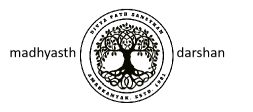Madhyasth Darshan – Introduction
Four Key points
- 'Jeevan Vidya' or Madhyasth Darshan (Coexistential Philosophy, Saha-astitva-vad) is a new knowledge system or philosophy (darshan) by A.Nagraj (1920-2016) of India that transcends existing frameworks. It is not based on past or existing human theories.
- It clarifies the origins, existence and precise relationship between the conscious (spirit & mind) and matter, with profound implications for us humans. The expression of the inseparability of material, conscious and spiritual entities itself is Madhyasth Darshan.
- It is practical & teachable resulting in individual happiness, peace etc & humane virtues such as kindness.
- It provides all-round resolution to our current personal, familial, social & ecological problems, allowing us to make sense of living. It enables us to have comprehension of every aspect of existence (reality) & human life.
Background
Madhyasth Darshan (Jeevan Vidya) or ‘Coexistential Philosophy’ has come about via original existential exploratory-research by (late) Shri A Nagraj of Amarkantak, India (originally from Hassan, Karnataka). It is a new discovery that inaugurates the fundamental nature of the Universe, Human Being, Consciousness & Human purpose.
This is not based on any religion, sect, politics or money, but on natural laws, on reality. This is an ‘existence based human focused contemplation’. This Coexistential Philosophy (Coexistentialism) is being presented as an ‘Alternative’ to Materialism(Science) and Theism/Spiritualism for evaluation and study by humankind.
Salient Points
This philosophy is comprehensive. It examines, & provides an integral-view of all dimensions of human life:
- spiritual (existential, experiential),
- intellectual (logical, rational),
- behavioral (emotional) &
- material (sensory, occupational)
It does not
- Talk of ‘renunciation‘ or ‘negate’ the world we live in – it rather explains it.
- Talk of ‘indulgence’ in the world – it rather lights up our relationship with it.
- Is not a lesson in morality – rather the uncovering the natural state of being in every Human
It enables freedom :
- freedom from prevailing individual criminality & communal mentality between peoples
- freedom from illusion(delusion) and
- freedom from mania for profit, consumption and sex
It is practicable :
- It can be studied and understood by every human – logically & intuitively.
- It has a definite method of study by which we can have realization.
- It comes in education: is universal, verifiable & free of mysticism.
It comes in living :
- Enables human character: morality in wealth, behavior & marital-life.
- Enables virtues like simplicity, generosity, kindness & benevolence.
- We can understand ourselves as humans and fulfill our relationships in family, society and nature. We can live purposeful and meaningful lives.
It has all-round solutions for the myriad problems all of us face, the world faces:
- Personal strife and meaninglessness
- Interpersonal issues with people – in the family & around
- Societal conflict – like war & exploitation
- Ecological problems – pollution & resource depletion
Basic Message
- Existence is in the form of Coexistence of material, conscious and spatial realities
- Human being is the combined form a conscious Self (jeevan) & Material Body .
- Humans on this planet are currently in a state of incomplete understanding, or illusion.
- With the Knowledge & living of Coexistence, all human problems can be resolved.
The Literature:
Consists of a set of 12 books originally written in Hindi, not based on any past or current texts. They contain a Study of:
- Existence & evolution (reality)
- Consciousness: its origins, development & awakening
- The Human Being & Human Purpose
- Humanness & Living - recognizing & fulfilling all relationships & values
- Humane (Undivided) Society - culture & civility (sanskriti, sabhyata)
- Humane (Universal) Systems - education, health, justice, production & exchange
A study of every aspect of everything.
New Darshan (philosophy, view of reality):
Philosophy of Human Behaviour (manav vyavhar darshan)
Philosophy of Human Action (manav karma darshan)
Philosophy of Human Practice (manav abhyas darshan)
Philosophy of Human Realisation (manav anubhav darshan)
Alternative Dialectics (vaadas):
- 'Resolution-centric Materialism' (samadhanatmak bhoutikvad)
- instead of Conflict-centric Materialism: dvandvatmak bhoutikvad
- 'Realisation-centric Spiritualism' (anubhavatmak adhyatmavad)
- instead of Mysticism-centric Spiritualism: rahasyatmak adhyatmvad
- 'Behaviour-centric Humanism' (vyavharatmak janvad)
- instead of Struggle-centric Humanism: sangharshatmak janvad
Alternative Codes for Living (shastras):
'Cyclical Economics' (avartansheel arthashastra)
- instead of Profit based Economics: labhonmaadi arthshastra
- 'Behavioural Sociology' (vyavharwadi samajshastra)
- instead of Consumption based Sociology: bhogonmaadi samajshastra
- 'Consciousness oriented Psychology': (manav sanchetnavadi manovigyan)
- instead of Desire based Psychology: kamonmaadi manovigyan
Proposal to humankind
This philosophy is logically consistent and enables us to deal practically with the phenomena in nature, and verify it via direct experience and as proof in living – it is thus free of mysticism. This philosophy provides remarkably clear & precise definitions for every aspect of human living. This understanding & model of living is now available for study & practice.
A diverse set of people are now seriously evaluating this proposal. Efforts to bring this into education are underway in India. You can find details of our efforts in education here.
This is a proposal for Universal Good.
The Human search for the origins, nature & purpose of ‘consciousness’ is over.
It is now available for study.
The expectation of ‘knowledge’ from India that has existed from time immemorial, has now been completed.
सुदूर विगत से भारत से जो ‘ज्ञान’ की अपेक्षा रही, वो पूरी हो चुकी है |
*# See this schematic that illustrates the placement of 'Madhyasth Darshan' vis a vis other bharatiya darshans.
Terms:
- Madhyasth – means Mediating, the stabilizing aspect in Existence.
- Darshan – or philosophy is a direct insight into reality and its exposition
- Saha-Astitva-vad: Coexistential Philosophy or Coexistentialism, is dialectics
- Jeevan – name for the conscious aspect, unit
- Jeevan Vidya – program for public dissemination, knowledge of 'jeevan'
